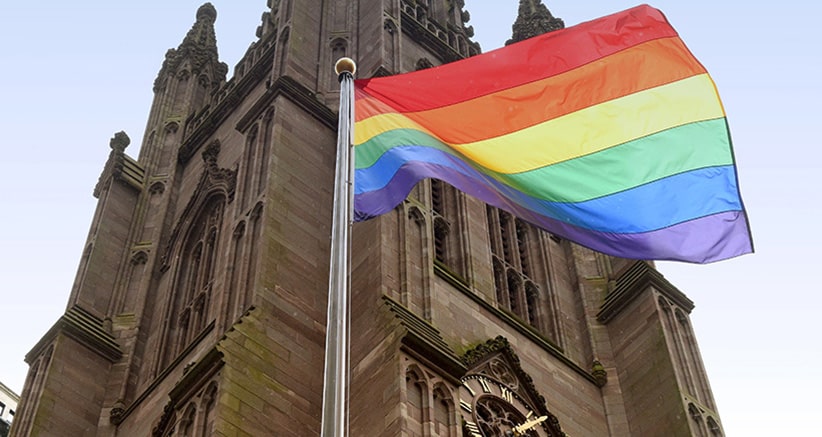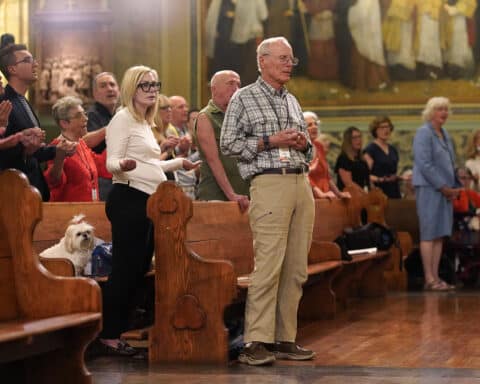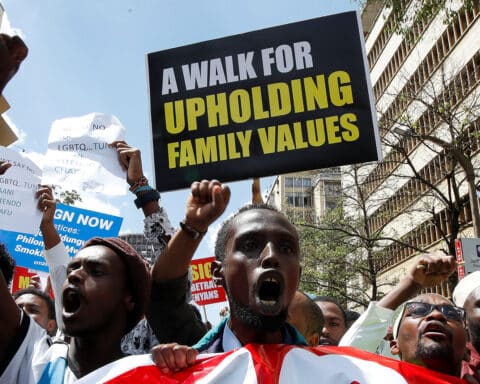What would it mean to reach out to those who feel alienated from the Church? In a recent article in America Magazine, Cardinal Robert W. McElroy, bishop of San Diego, called for, among other things, “radical inclusion” of “L.G.B.T. persons” to the Eucharist, without regard to the New Testament’s teaching concerning Christian chastity. He suggests that the Church’s prohibition of any kind of sex outside the marriage bond should be challenged “head on.”
At face value, the cardinal’s proposal offers a significant deviation from the teaching of St. Paul — which the Church has followed faithfully for two millenia — who instructs, “whoever eats the bread or drinks the cup of the Lord unworthily will have to answer for the body and blood of the Lord” (1 Cor 11:27). For purposes of admission to the Eucharist, Cardinal McElroy asserts, we should not distinguish between “those who refrain from sexual activity and those who do not,” nor with respect to marital status or the gender(s) of one’s sexual partners.
Attracting the next generation to the Church?
Cardinal McElroy leaves little doubt about his position. There’s no dodging and weaving in his wholesale rejection of Christian moral doctrine on sexuality and marriage. The cardinal suggests that the Church must abandon her moral teaching “if we are to have any hope of attracting the next generation to life in the Church.” But this is a recipe for accelerating the decline in the Church, not a formula for its revival.
The sexual morality that Cardinal McElroy here outlines is identical to that of the American Episcopal Church. And what has happened in that denomination these last years? The Episcopal Church has seen a decline in attendance from 658,000 per week in 2010 to about 293,000 in 2021. Average Sunday attendance per church is about 50 people. To abandon our moral principles would be to trade our birthright for a bowl of soup.
Drop ‘BTQ’ for true ‘LG’ accompaniment
In the course of Cardinal McElroy’s “proposal for inclusion,” he does, however, implicitly raise an important point of moral and pastoral practice. While we cannot abandon Catholic moral doctrine in one synodal sweep, we must sharpen our focus on how to genuinely accompany Catholics who experience same sex attraction. To do this, however, we must drop “BTQ” since these letters represent a strategic political alliance rather than actual philosophical resonance.
To attend to the spiritual and moral care of people with same-sex attraction, we must distinguish it from bisexuality, so-called “transgenderism,” and the deviant catchall “queer.” Doing so will allow us to have a serious, sensitive and pastorally effective discussion about the “LGs.” By refusing to meet the needs of particular identity groups, we confuse the moral issues across categories. The result is further disservice to same-sex-attracted Catholics, and the creation of more obstacles to inclusion.
Distinguish to serve, not exclude
By no means does my proposal suggest that the Church abandon persons with gender dysphoria. But the rejection of one’s own embodied sex is a different question from sexual attraction. Therefore, our response must also be different. We cannot deny that a person is sexually attracted to a person of the same sex, any more than we can deny that a person is attracted to persons of the opposite sex. Of course, this presents pastoral challenges; but same-sex-attraction is more complex than simply a “choice” or “preference.” This does not mean, of course, that we endorse or condone sexual activity for this person any more than for any other unmarried person. Accompaniment begins by affirming the truth that a person is sexually attracted to his or her own sex and the truth that such a person is called to a life of chastity.
Reality is received. For the same reasons that we hold that sexual intercourse is ordered to procreation and reserved for marriage, we deny that a man can become a woman and vice-versa. Unlike an affirmation of sexual attraction, we cannot affirm the truth that a man can become a woman. Gender dysphoria is a disorder in need of treatment rather than an attraction in need of empathy. Of course, as Catholic Christians we are called to love, serve and welcome such persons. But we do them no service, and we extend to them no love, if we adopt the falsehoods of transgender ideology.
Love, synodality and empathy
As Catholic Christians, we must be messengers of grace and love to every heart, regardless of a person’s experiences, lifestyle or wounds. The challenge to balance moral integrity and pastoral sensitivity is a mighty one. But we must not take shortcuts by denying the teaching of the Church, nor by calling things true that are false. Neither, in the name of synodality, can we bow to the sexual idols of the age and call it witnessing to the Gospel. We can affirm Cardinal McElroy’s call for hospitality and “radical inclusivity.” But we must emphatically reject his definition of the phrase, which fails to make necessary distinctions and rejects the truth of the Church’s perennial moral teaching.
To be “radically inclusive” consistent with the Church’s teaching, we must make the necessary distinctions. The appropriate pastoral response must vary for these very different situations. Removing the “BTQ” would be the first step in affirming the full dignity of same-sex-attracted people, in particular, without confusing their pastoral needs with the needs of others. To fail to do so will only deny other ailing souls the empathetic response of the Gospel.
Kenneth Craycraft is a columnist for Our Sunday Visitor and an associate professor of moral theology at Mount St. Mary’s Seminary and School of Theology in Cincinnati. Follow him on Twitter @krcraycraft.





